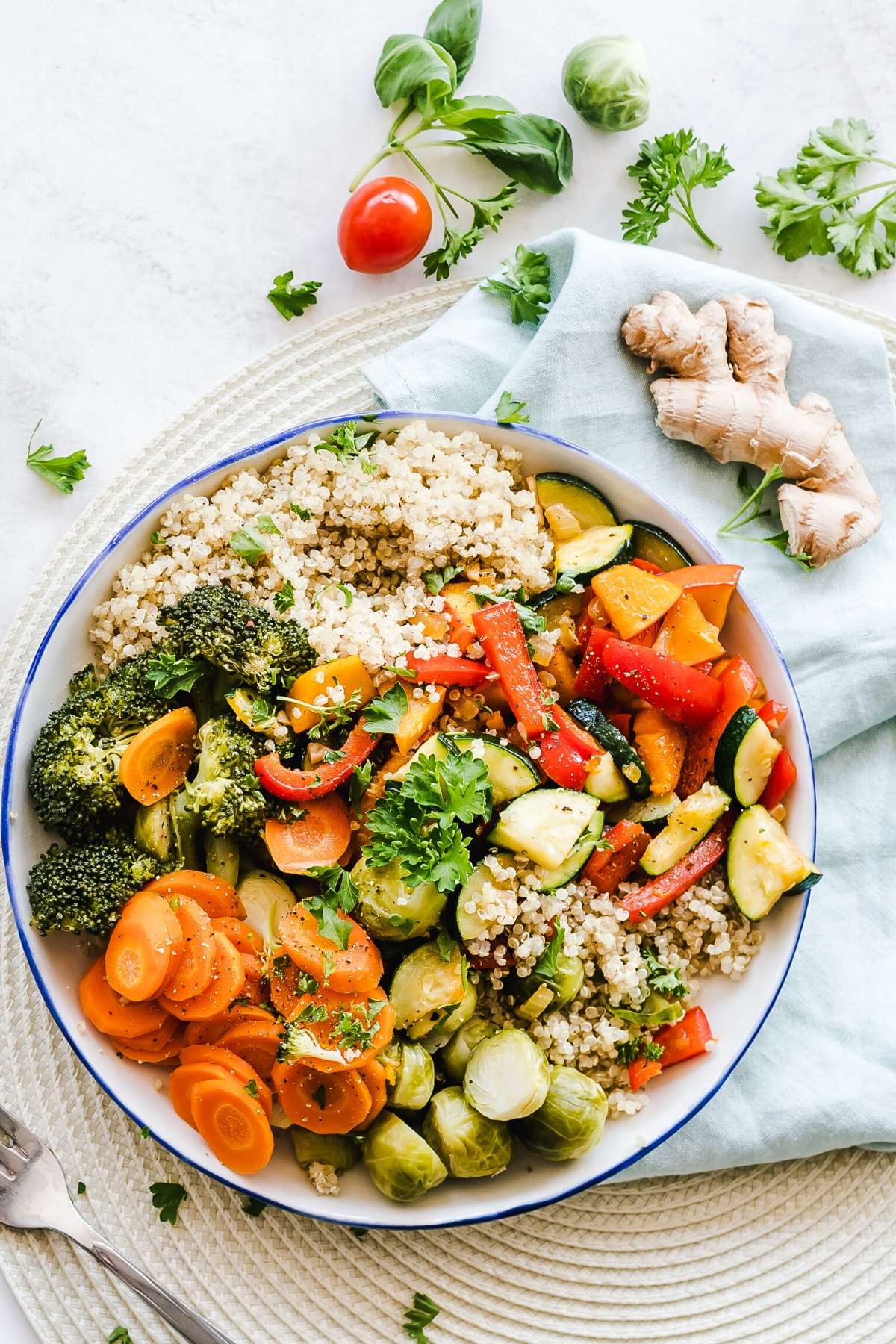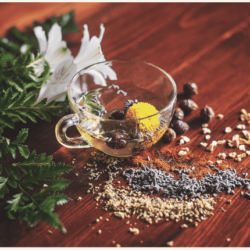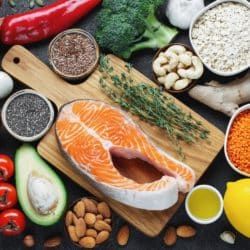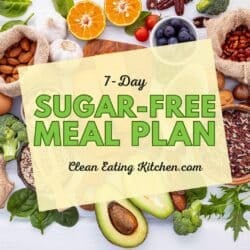10 Ways to Fight Fatigue on a Vegan Diet
If you’re on a vegan or plant-based diet and are always feeling tired or run down, then you need to check out these 10 ways to fight fatigue on a vegan diet. I’m sharing these tips along with my personal story of fatigue on a vegan diet.

10 Ways to Fight Fatigue
Whether you’re new to a vegan or plant-based diet, or you’ve been doing it for awhile, you may start to experience fatigue, headaches, tiredness, or mood changes. Some of the common questions and concerns include:
- I went vegan or vegetarian and I’m feeling weak or tired.
- I went vegan and I’m feeling depressed.
- My adrenal fatigue got worse on a vegan or plant-based diet.
- I’m eating a vegan diet and getting dizzy spells.
If any of these issues related to you, then read on! You’ll probably find at least one tip or more that can help resolve your fatigue on a vegan or plant-based diet.
Plus, be sure to read the section at the end of this post to help determine if dietary changes may be necessary to help resolve your tiredness.
1. Get good quality sleep
Believe it or not, but the most common reason for fatigue is poor sleep, or not getting enough sleep.
I went through a period of several months where I would go to bed at a normal time, but wake up only 4-5 hours lately completely awake. So, rather than toss and turn for hours, I would get up but then be exhausted later in the day.
Whether you have insomnia like I had, or you have sleep apnea, hormone imbalances like estrogen dominance, or something else that is causing sleep disruptions, it is important to address this issue.
In regards to a plant-based diet and disrupted sleep, there could be several issues at play.
For instance, are you eating enough, especially later in the day? If you are waking up hungry, then you need to increase your calories overall. You may also need to adjust your macronutrients to increase satiety.
Secondly, have you developed any nutrient deficiencies on a vegan diet? Issues like low iron can lead to restless leg syndrome which can definitely make it harder to sleep. In this case, you’ll need to work with your healthcare provider to increase sources of iron (or maybe even take supplements) to increase your iron.
You may need to consult your healthcare provider to help rule out any other conditions that might be affecting your sleep. Once you get your sleep under control, you will likely feel less fatigue.
2. See professionals and get appropriate tests to identify medical problems
Don’t wait too long to try and figure out if your fatigue is related to health condition. Fatigue can often be related to an autoimmune disease such as Hashimoto’s Thyroiditis.
Women’s concerns about fatigue can often be dismissed by doctors, so it’s important to be your own advocate and ask that your thyroid levels be tested.
if not well-planned, vegan diets can lead to deficiencies in certain nutrients such as vitamin B12, omega-3 fatty acids, iron, and zinc, which are important for immune system function.
A deficiency in these nutrients could potentially contribute to immune dysregulation.
If your thyroid is healthy and you can rule out thyroid disease as the cause of your fatigue, then it’s also worth having your ferritin levels tested to make sure you aren’t anemic.
Learn more about ferritin testing and how you can order your own lab tests.
3. Take appropriate supplements for fatigue
Your doctor or healthcare provider can likely suggest some supplements to help with your tiredness.
Whether you are in need of more protein, more iron, or something else, it’s important to get some expert input about your individual situation.
And, be sure to check out this article with natural ways to increase energy which includes a whole list of supplements that can help.
You may also want to read my articles on the best supplements for women over 30 and the best supplements for women over 50.
4. Use a plant-based protein powder supplement and eat more protein rich plant foods
While many vegan diet advocates say that you can get all the protein you need from whole food plant sources, there are some women who need more protein.
This was the case for me when I was on a vegan diet. While I ultimately stopped being vegan, I usually felt less tired when I added a plant-based protein powder to my morning smoothie.
There are some great plant-based protein powders on the market now, and you can choose from a variety of ingredients including rice protein, pea protein, hemp, soy, and more. Just try a few different brands and see which one works best for you.
Check out why list of the best clean protein powders.
5. Practice stress management
Since there are so many stressors in the world right now, it’s that much more important to learn to manage that stress. If you don’t, then you will likely feel run down and not as energetic as you normally feel.
Stress management can include everything from meditation, sitting quietly, spending time with friends, being outside in nature, or journaling. Or, if you are truly suffering, you can also reach out to find a therapist who can help you develop coping skills.
6. Get appropriate exercise
While getting daily movement is important, you might need to make sure you aren’t working out too hard. Fatigue is an important indicator that you might be over-training or under-training.
Some experts say that most adults need about 30 minutes of exercise a day.
7. Drink green tea
While hyping yourself up on caffeine isn’t the best way to combat fatigue, a glass of green tea can help. In addition to being high in antioxidants, green tea also contains l-theanine. L-theanine can help improve focus and mood.
You can buy green tea loose or in bags, or you can also try match (learn about the health benefits of matcha). Don’t miss my recipe for Coconut Matcha Latte.
8. Eat a variety of plant-based foods with minimal processing
When you’re eating vegan, it can be tempting to turn to vegan junk foods. Fake meats are not healthy foods, and neither are sugar-filled vegan desserts. Learn more about the risks of plant-based meats.
Instead of eating processed foods with refined oils and sugars, it’s better to choose whole foods such as fruits, vegetables, legumes, grains (if they work for you), nuts and seeds.
If you are having a hard time figuring out how to eat on a vegan diet, then you might benefit from consulting a dietitian or nutritionist who can help you create a meal plan that is tailored to your individual needs.
You may also want to read this article about myths of a plant-based diet.

9. Soak and sprout foods
If you find that you feel really tired or bloated after eating a plant-based meal, then you might try soaking and sprouting your foods. Beans, nuts, seeds, and many grains can all be soaked before being cooked.
While it does take extra time to soak and sprout your foods, it can make all the difference in how your body digests those foods.
10. Consume minimal refined sugar
While eating sugar can give you more energy in the short term, you’re probably familiar with the energy crash that can occur once the sugar high wears off. It’s important that you wean yourself off too much refined sugars.
it can be hard to get over a sugar addiction, but you can move toward natural sugars from fruits and dates to help.
See my related article with the benefits of going sugar-free.
Vegan Fatigue FAQs
It is definitely possible that the cause of your fatigue is that a vegan diet is not working for you. There are some health risks that come with a vegan diet, and not everyone knows about these risks. Consider the differences between vegan and vegetarians and think about expanding your dietary choices.
If you determine that a vegan or plant-based diet isn’t for you, then you might need to consider re-introducing meat back into your diet.
It’s impossible to list all the potential causes of fatigue, so it’s probably a good idea to consult a healthcare provider to rule out any major nutrient deficiencies or diseases that may be causing you to feel fatigued.
You can also check out this post with reasons and tips to help if you’re feeling tired all the time.
More Health Articles You Might Like
Conclusions
If you are on a vegan diet or a plant-based diet and experiencing fatigue, there are several ways to try and feel more energetic. If your tiredness does not improve, then it may be time to consider seeing a dietitian or your doctor to rule out other conditions.
Don’t forget to join my newsletter list to get exclusive clean eating recipes and tips. The newsletter is 100% free with no spam; unsubscribe anytime.
About the Author: Carrie Forrest has a master’s degree in public health with a specialty in nutrition and is studying to be a holistic nutritionist. She is a top wellness and food blogger with over 5 million annual visitors to her site. Carrie has an incredible story of recovery from chronic illness and is passionate about helping other women transform their health. Send her a message through her contact form.
Note: this post is for informational purposes only and is not intended as medical advice. Please consult your healthcare provider for recommendations related to your individual situation.





















Wow, that is an interesting statistic. I’ve only been vegan for about 6 months and so far feeling great, but I have heard many stories of people who have gone vegan and not stuck with it, but I feel that I’m vegan for much more than health reasons too.
What an interesting post!
Robyn xx
Thank you, Robyn, and congrats on your 6-month vegan-versary. I do think that the key to sticking with it long term is to get whatever help you need if/when that happens. I don’t necessarily think that folks on plant-based diets have any more “issues” than people on other diets, but it can be harder to find support since we are in the minority and most doctors can’t really give experienced advice.
I am always in anticipation of reading your posts and this one was no different. Great points, all of them.
And, PLEASE teach us about sprouting! I’d love to give it a try, but I have read differing opinions on the process. I completely trust you 🙂
Thank you, Jennifer! I am so completely fascinated by the topic of sprouting, so I will make it a priority to learn as much as I can and share it ASAP. 🙂
I’m very much looking forward to reading more about the “ex-vegan phenomenon”! I didn’t know that was something that was actually explored. I can imagine that many vegans tire out from the extra work & effort that can often go into preparing food or ensuring there is vegan food when dining out or at parties. Although being vegan is 2nd nature to me now, I still have moments where I’m surrounded by others eating stress-free “normal” delicious-looking meals and wonder “Why am I still doing this?” And it’s quite easy to imagine eating many of the foods I’ve given up. But that’s just it, that’s the easy part. The more difficult path is not allowing oneself to become disassociated from why veganism is a choice they made. When I reconnect with why I avoid animal products, it’s easy to justify living a life that involves (minor) hassles around food. Just wanted to add a different perspective!
Great, I’m so glad you offered your perspective, Julia! Having an ethical viewpoint has made the process easier for me as well. I am much more likely to “cheat” and have something with sugar in it than to even consider having something with animal products. I think you’re right that it’s more difficult to stick with what is truly important to us. As I get older, I’m starting to get this understanding that life is short and we all have such a short amount of time to do what we think is right. Even if nobody knew my beliefs or had any idea of what I was doing, it would still be important to ME that I live my values. Xoxo.
Great post, Carrie. It’s nice to see people like you and Sayward being open and honest. You have to listen to your body and the signals it’s sending you. That doesn’t mean you have to change your value system. What works today for your health might not work in 10 years, but you can adjust and still feel good about how you are living.
Thank you, Robin. I have a hard time figuring out what my body is trying to tell me sometimes, but I do know what it’s like to feel tired. So, I’m trying to learn to rest more and make those adjustments that help. I’m glad you liked my post.
Bravo for sharing your journey, Carrie. Oddly enough, I may be the only physician here and compelled not to offer any advice. I hope you are working with someone you trust who will first make sure you are not deficient in specific nutrients, protein or calorie consumption as well as your endocrine and cancer history. You are a complicated girl!!
Thank you, Janet, for chiming in and offering words of support. I’m sure you have tons of great advice for your patients and I just love that you are doing the work you do. I do feel lucky to have wonderful resources and access to experienced medical professionals. I suppose the hard part for me was admitting that I needed help, getting several varying opinions, and then deciding which route was the best for me. The not-doing-anything and hoping-it-would-magically-get-better was NOT the answer for me and I only regret that I didn’t do something sooner.
I too have been experiencing fatigue. I did last year also when I went super restrictive on a clean eating diet – I only ate things I made. It was tough, but I could tell I wasn’t getting enough something because I didn’t even have the will to workout, or get up when the alarm went off. It was a force to get me out of bed. I am feeling that again now as I am on a semi-less restrictive cleaner eating, but I can feel it coming on. It is tough being vegan, eating clean or no-processed and continuing it!
Thank you for the note, Megan. I’ve recently “allowed” myself to eat plant-based restaurant meals, and enjoy them! I went through a weird time right before and after my cancer surgery where I wouldn’t touch sugar, salt, or oil because I was convinced they would make my cancer worse or make it come back, but I’ve since gotten over that and realize that my mental health is equally as important as my physical health. So, it’s been a learning process for me to let go of the idea of being the “perfect” plant-based eater and just enjoy my life. Trying to be perfect and then feeling guilty when I’m not is a practice hereby banned from my life, dammit! 🙂
I love this comment!! Thank you so much! Your psychological health is very important, as you say. I found that out recently as well, after living 3 years of trying to be a perfect eater/person, and then feeling guilty. I love that you emphasize that enjoying your life is more important! So true
I’m excited this aspect resonated with you, Bo. I so agree and have just started to let go of that idea of being perfect. Being gentler with myself has made a HUGE difference, but it’s something I have to work on every single day. I decided I am worth the effort, though. 🙂
I think this is such an important point, Carrie. I watch a LOT of vegans and vegan bloggers become so caught up in eating “healthfully” that it literally destroys their mental well-being. I always tell my clients – oftentimes the mental anguish, active self monitoring, and STRESS it takes to not eat the treat is actually WAY worse for your overall health than just eating the dang treat and moving on!
Of course there’s a balance and that’s not carte blanch to eat whatever, whenever. But I just see so many vegans making themselves sick [literally – stress will manifest in your physical health!] over their food choices. I thikn we would all do well to relax our food rules. I know that for me and for many of my clients, it’s been the single most important adjustment for overall health.
♥
“Eat the dang treat and move on…” ha ha, YES! I so need to remember this attitude. 🙂
Hi Carrie,
I too have struggled with fatigue and also weight gain since my thyroidectomy. I don’t think a little pill of T4 can completely replace what our thyroids did. I think there’s a lot about metabolism that even endocrinologists don’t yet understand (and most of them will admit that). So we have to try to find ways to adapt to the new way our bodies respond, and thank you for sharing these tips to help with that!
Lisa
Hi Lisa! I can’t remember if we’ve discussed this, but I take Cytomel (T3) in addition to Synthroid and that has made a HUGE difference for me. I know you can probably identify with this, but I have on a few occasions been brought to tears wishing I had my thyroid back. Being that it was cancerous, though, I don’t dwell on this line of thinking, and just try to move forward the best I can. Sending you love and strength.
That’s interesting…was your T3 low or did they just start you on it to see if you felt better?
Hi Lisa! Let me think…I believe I just started feeling really crappy about 2 months after surgery when my natural thyroid ran out of my system. I suggested Cytomel to my doctor (he was skeptical, but I had heard about it from others) and it seemed to help. I’ve had to play with my dosage since then, but I do believe it helped me.
I agree with you wholeheartedly. Living with mental illness, rheumatoid arthritis, and secondary Sjogren’s Syndrome, I have to take traditional Western medication and doctors seriously (some say they’ve beat RA or mental illness without it; if so, I’m happy as can be, but this is where all my research has taken me); having said that, I research and use several holistic treatments in addition that, I believe, kept last year’s RA flare (yes, a year long), which was terrible, but about half as bad as my first one. This includes being vegan, of course, daily yoga, meditation, rebounding, watercuring, journaling, writing (doing what you love is always good medicine), and adequate sleep. And naps if I need one. During my last flare I’d wake up exhausted and take two long naps a day. Not a good way to live. I’m happy to report that with Obamacare (new comprehensive health insurance; I lost it when my divorce was finalized), I’m back on the medications and in therapy I need to heal my body and mind, while continuing the holistic and mind/body activities that help, too. I’m getting my life back and saving lives, too. It’s a wonderful feeling. Best wishes to you.
Wow, Lisa, it sounds like you’ve been through quite a lot. I am so happy to hear that you are getting the resources you need and, best of all, feeling good and doing your best work. Xoxo and best wishes back to you. Thank you for your honesty.
Those are 10 great pieces of advice! Thanks for sharing. I have struggled with fatigue, too. The biggest thing that made an impact for me was changing the landscape of my daily caloric intake. I now eat a gigantic breakfast & very hearty lunch, while dinner is something light and hydrating. Plenty of snacks in between meals of course! I never thought to connect my hour-by-hour eating patterns to that feeling of heaviness I would have in the mornings, but it’s made a huge difference. And has nothing to do with being vegan or not 🙂
That’s interesting, Shannon, because that’s exactly what my meal plan has evolved into. Breakfast and lunch are probably equal in caloric content for me now, with a much, much lighter dinner that doesn’t leave me feeling overly full or heavy going into my rest time. Thank you for sharing.
I’ve been vegetarian for about 22 years and vegan for most of the last 11. It’s interesting that you bring up the idea that vegans don’t need to think about protein. It’s always a point of debate about the vegan diet. All the debating seems to have the same underlying idea- that thinking about protein is somehow a bad thing. Really, anybody, eating any type of diet, who wants to be as healthy as possible, should be thinking about what their body needs. Admitting that we think about getting enough protein isn’t a form of defeat- it just means we’re thoughtful about what we eat. So I’m glad you brought it up and that you shared what you do to feel well. We all have different needs and there is nothing wrong with needing what we need.
Thank you, Jenny, and I think you bring up an interesting point about not viewing protein needs as defeat or a declaration that a vegetarian or vegan diet isn’t adequate. Something that has helped me in thinking about protein in general is the scientific structure of how proteins are built using amino acids. Since I am not willing from an ethical or health perspective to consume proteins from animal sources, I recognize that the burden of responsibility lies on me to get the correct building blocks that I need. That’s where the protein supplements have been helpful to me. Lastly, although I have not done so, I do know that there are amino acids blood tests out there for anyone who might want to see exactly which amino acids he or she might be low in, which makes the supplementation process much easier. P.S. Thanks for letting me use your comment to interject my thoughts on this. 🙂